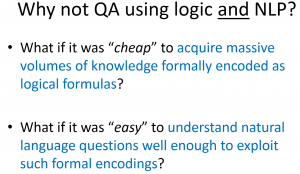Knewton is an interesting company providing a recommendation service for adaptive learning applications. In a recent post, Jonathon Goldman describes an algorithmic approach to generating questions. The approach focuses on improving the manual authoring of test questions (known in the educational realm as “assessment items“). It references work at Microsoft Research on the problem of synthesizing questions for a algebra learning game.
We agree that more automated generation of questions can enrich learning significantly, as has been demonstrated in the Inquire prototype. For information on a better, more broadly applicable approach, see the slides beginning around page 16 in Peter Clark’s invited talk.
What we think is most promising, however, is understanding the reasoning and cognitive skill required to answer questions (i.e., Deep QA). The most automated way to support this is with machine understanding of the content sufficient to answer the questions by proving answers (i.e., multiple choices) right or wrong, as we discuss in this post and this presentation.


